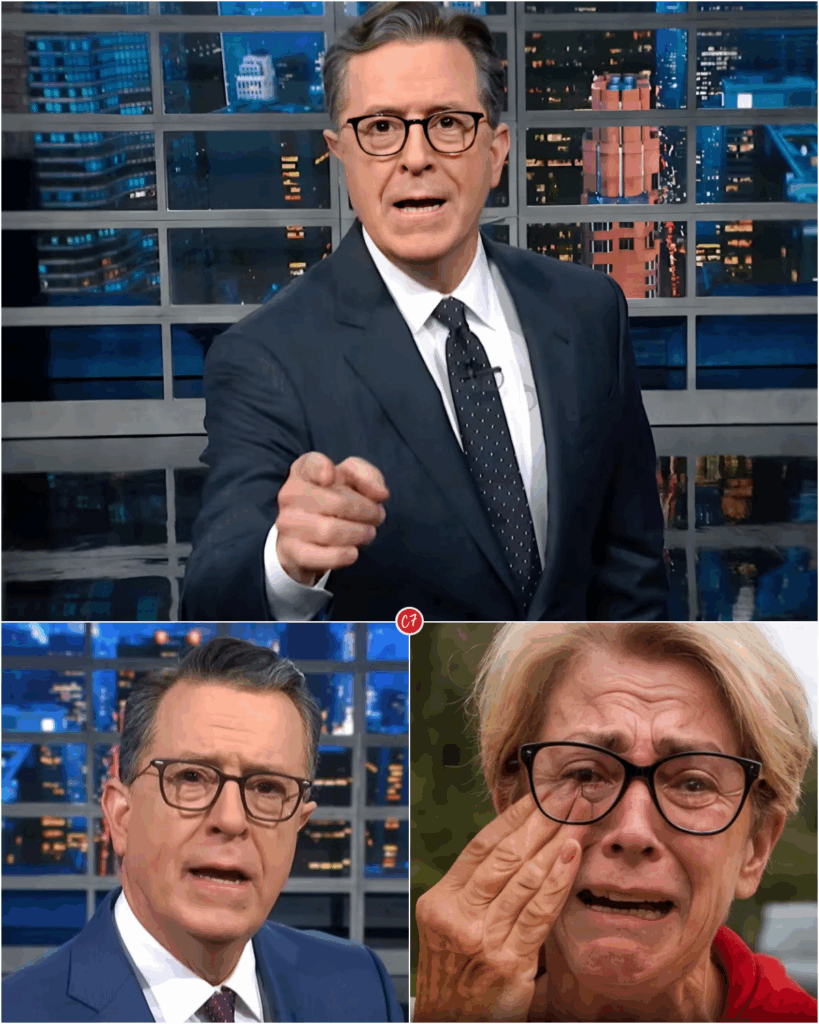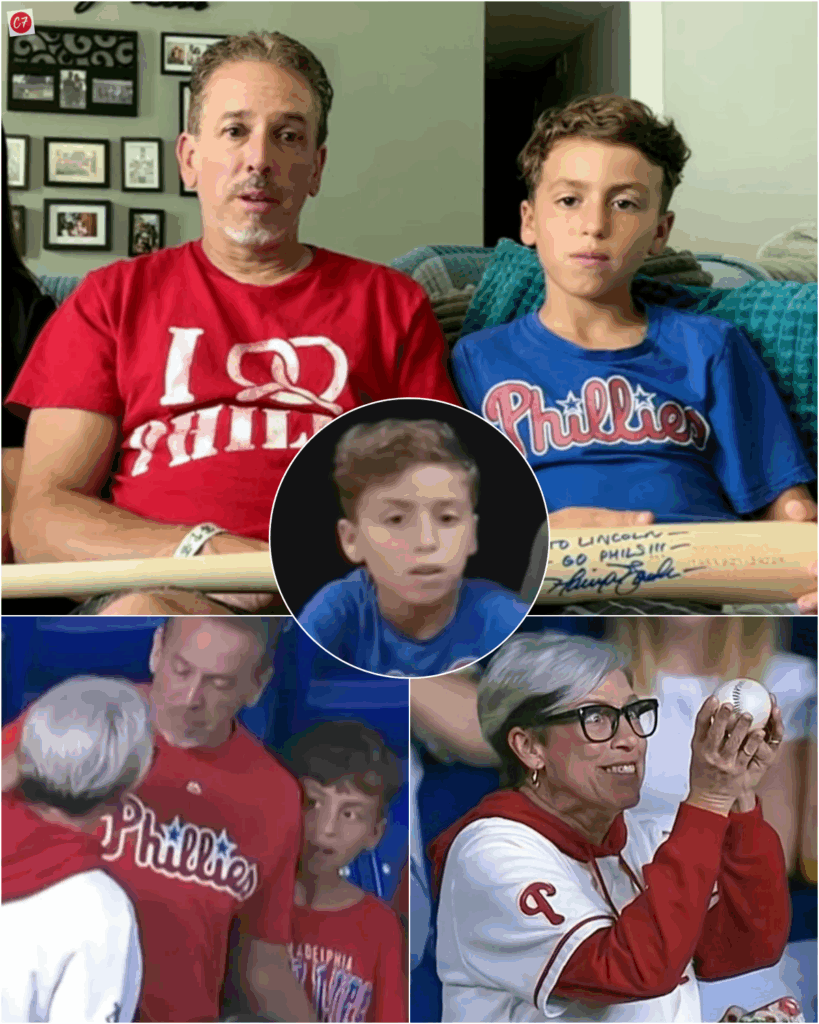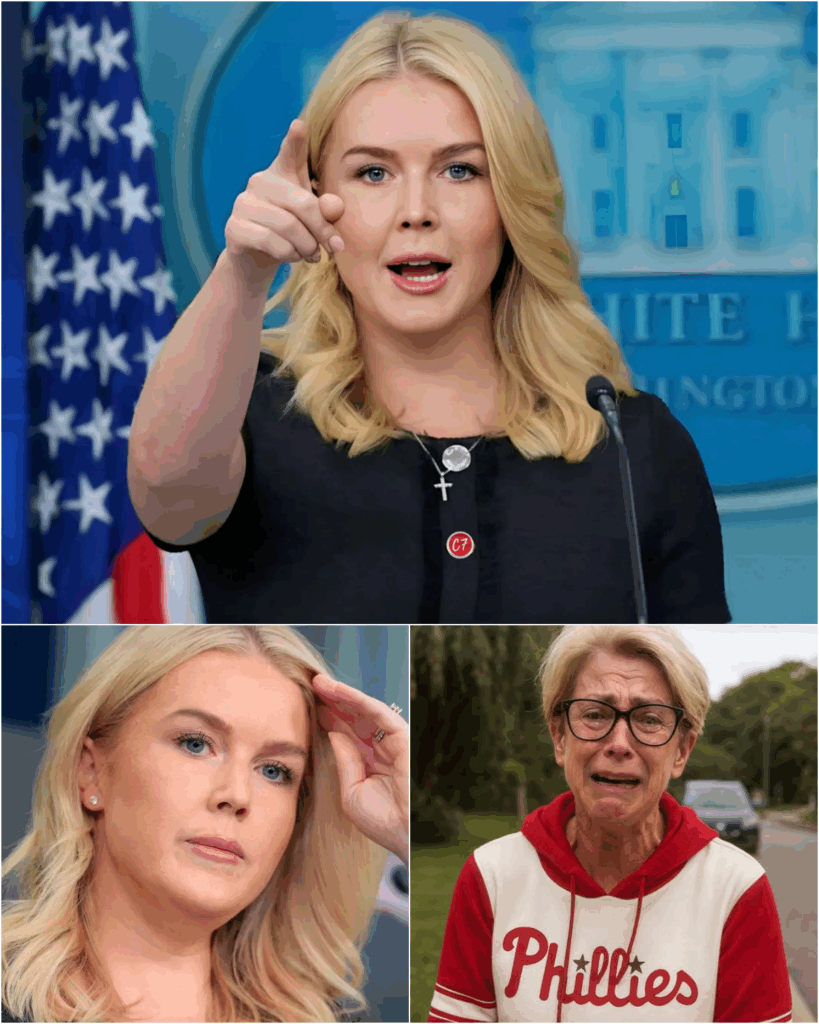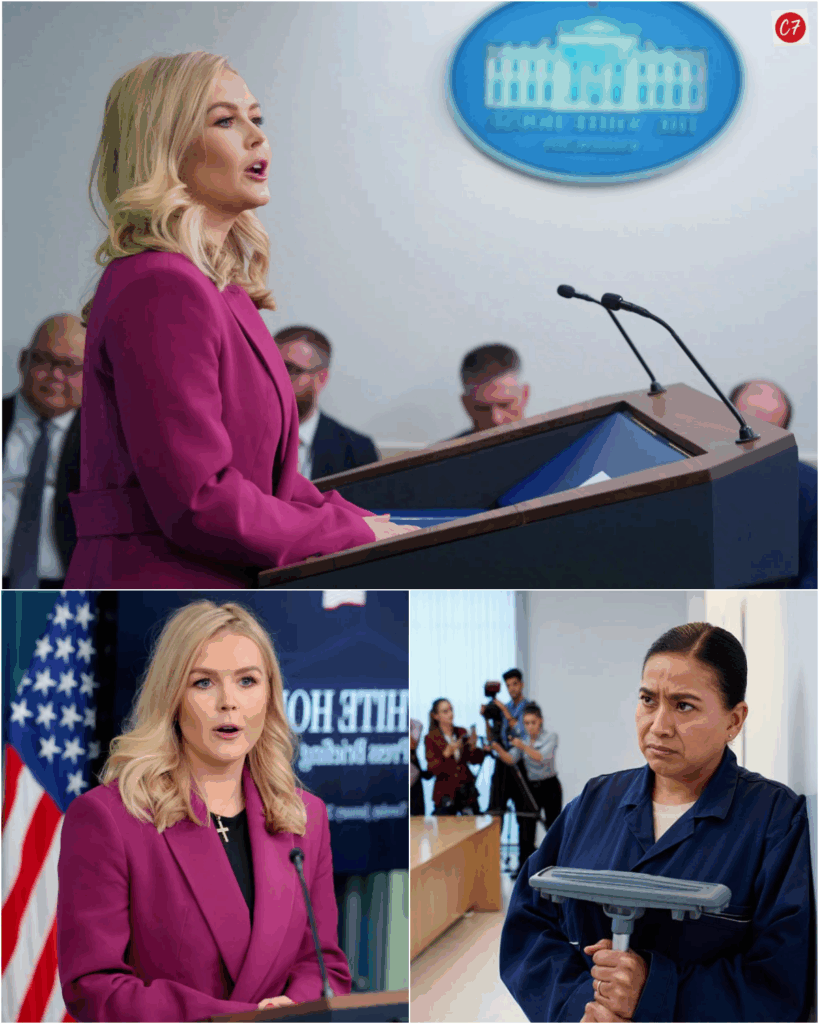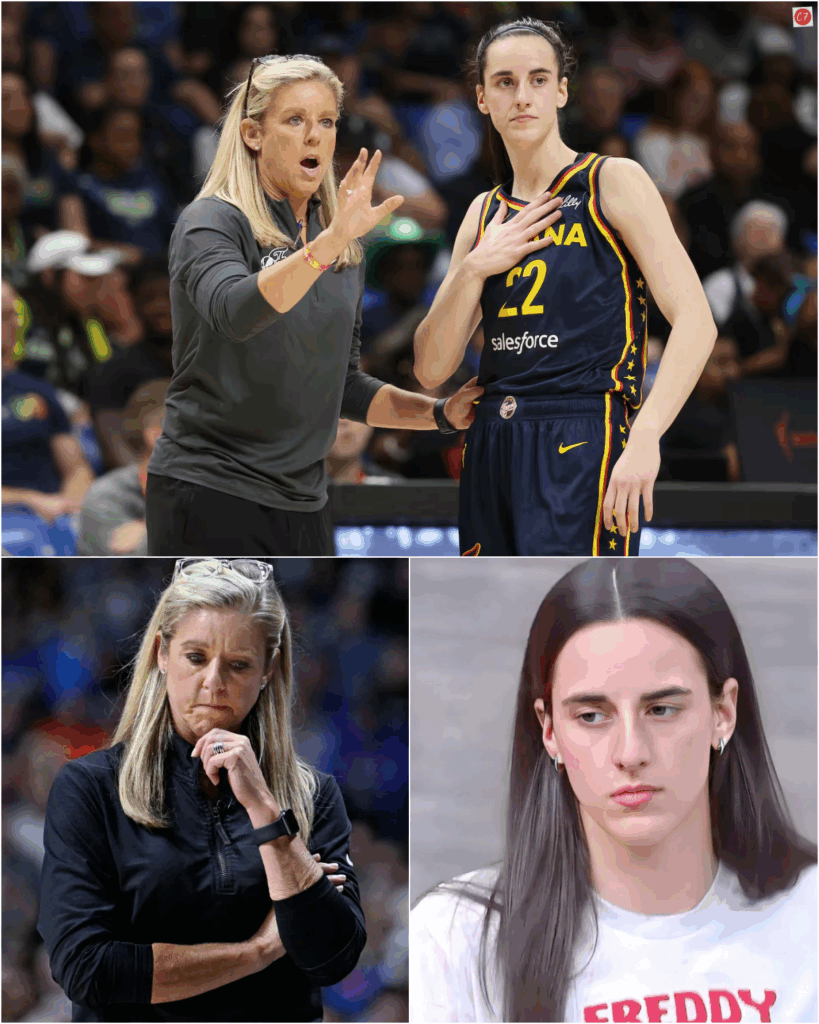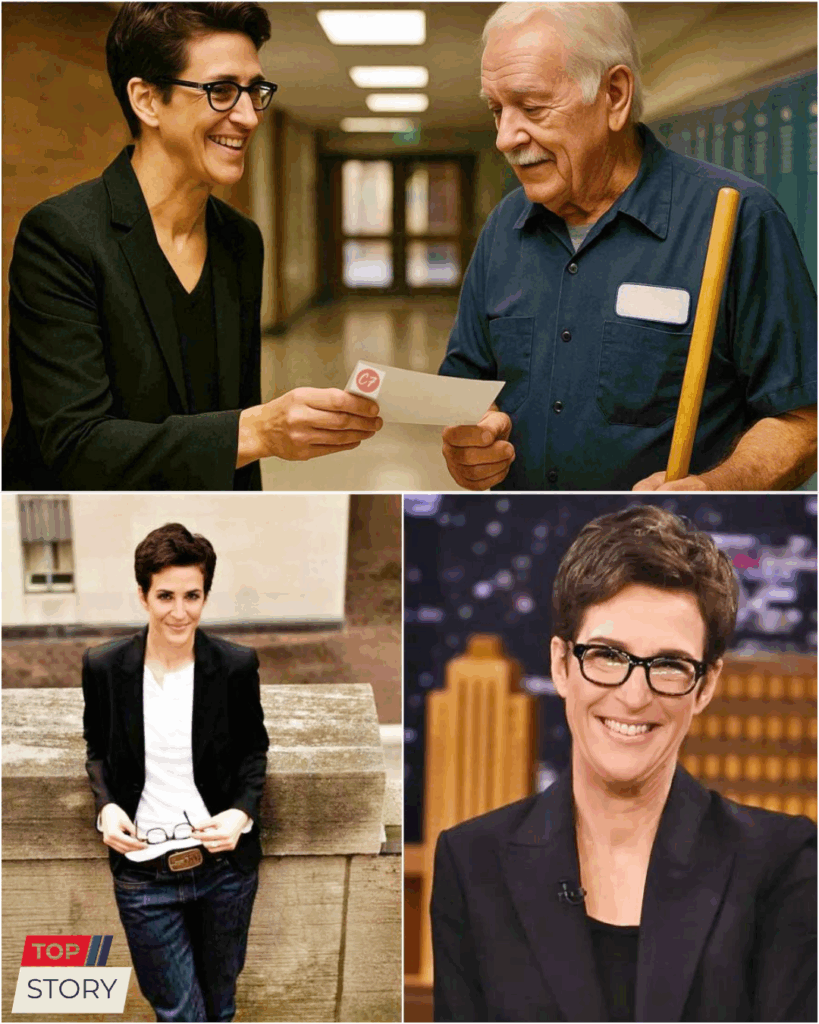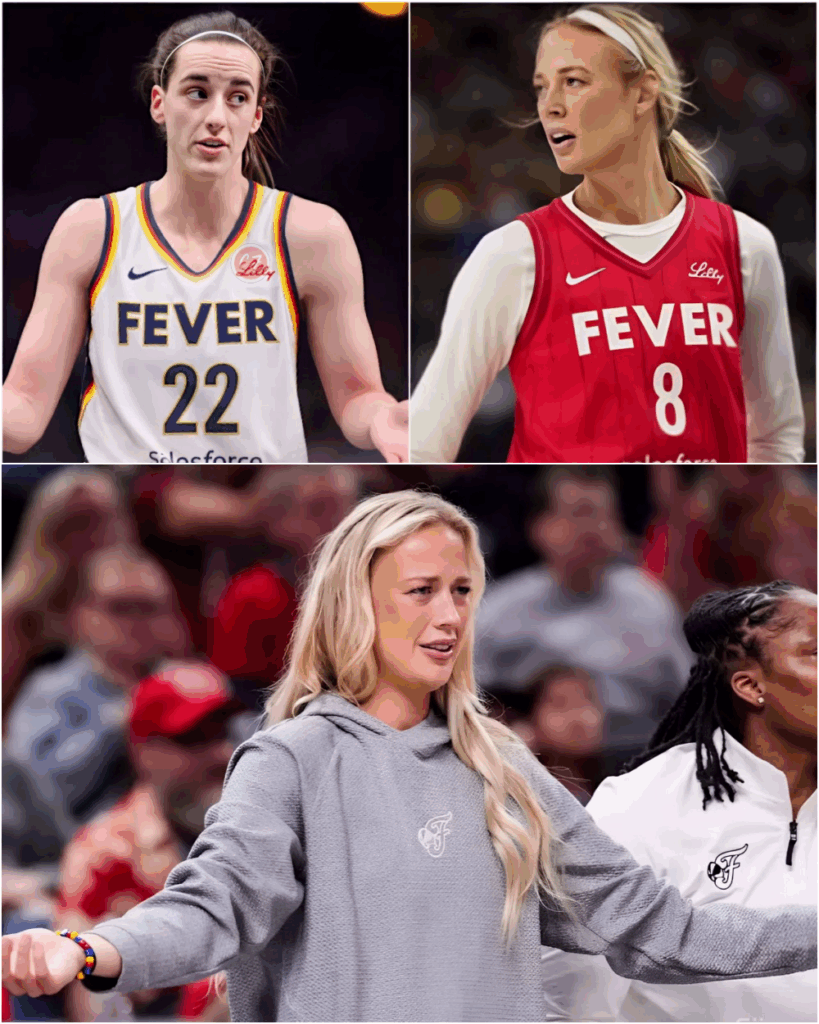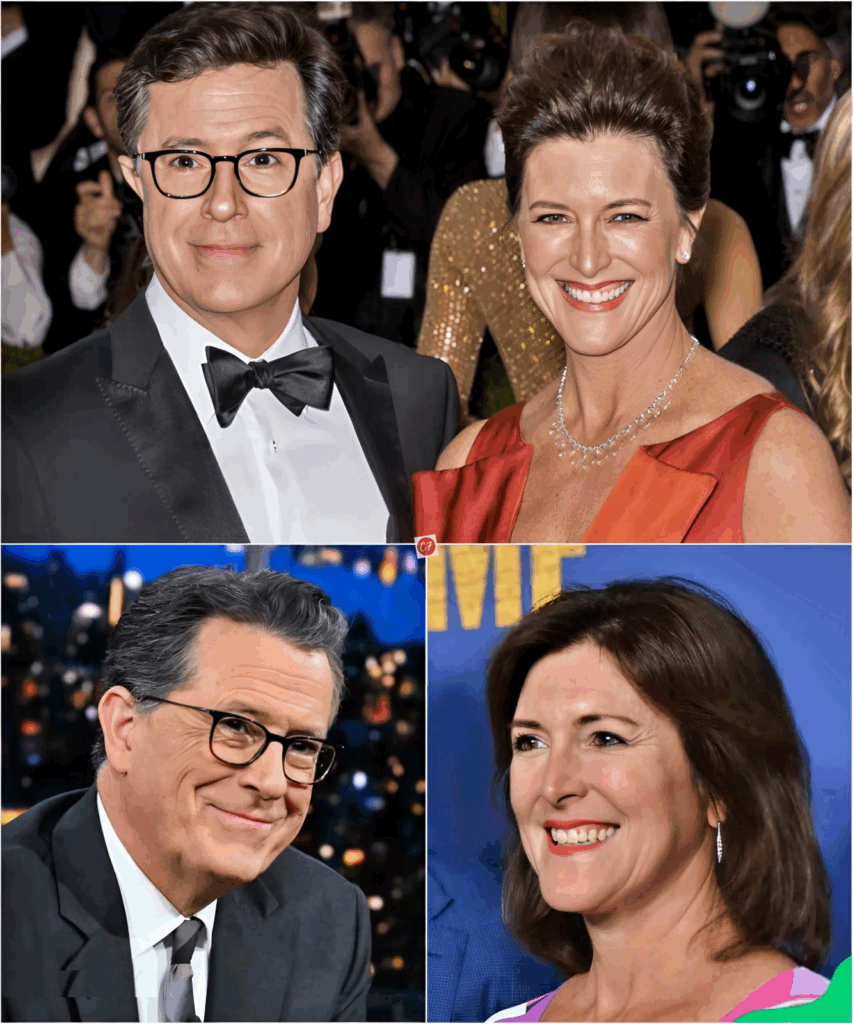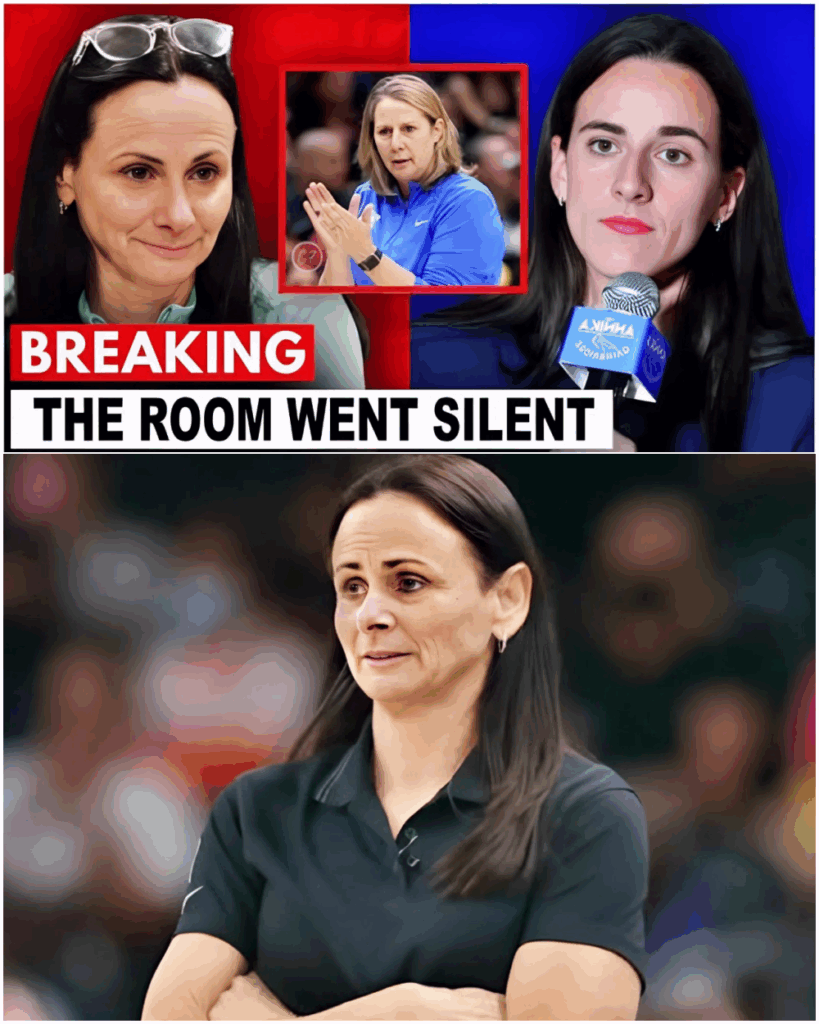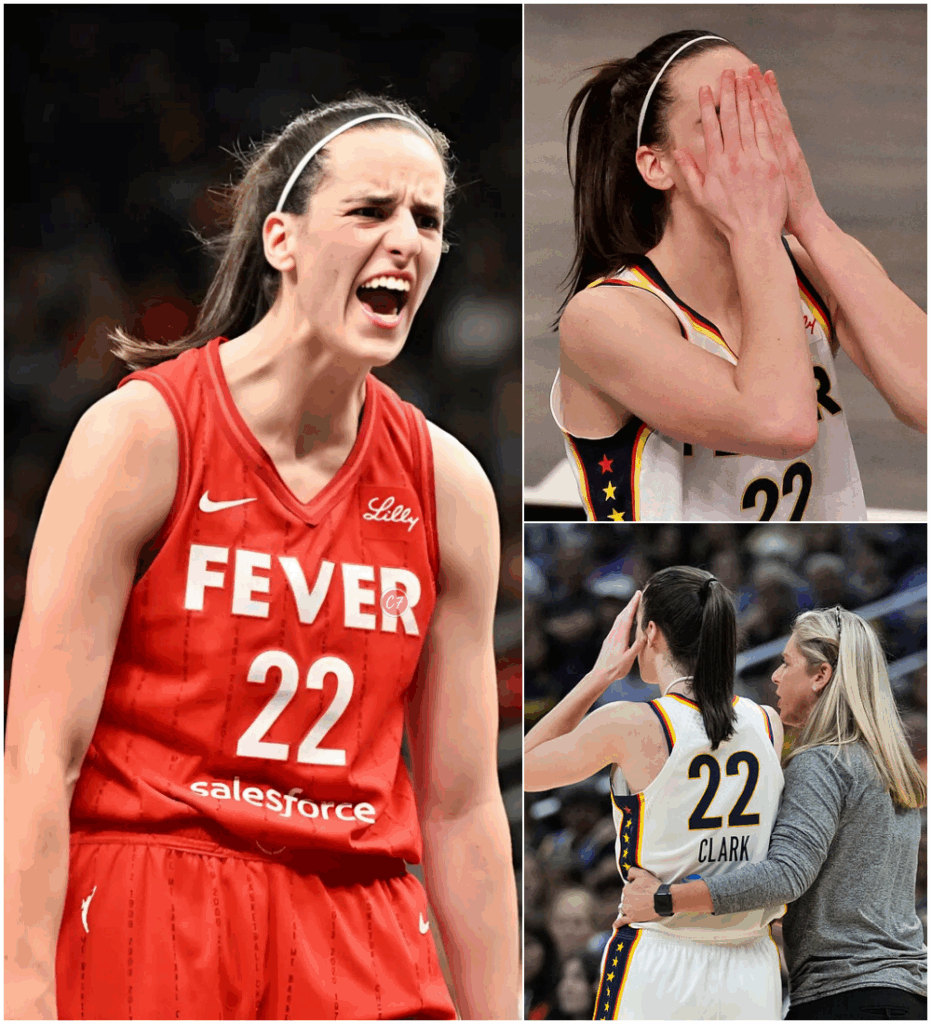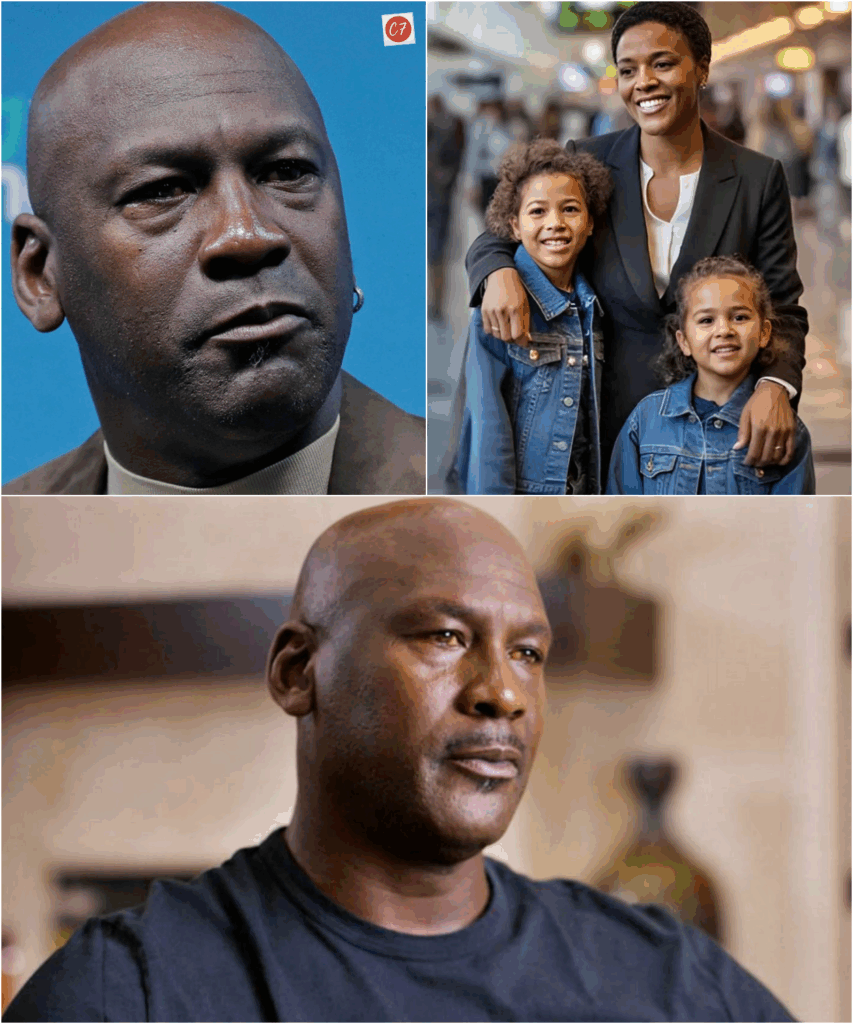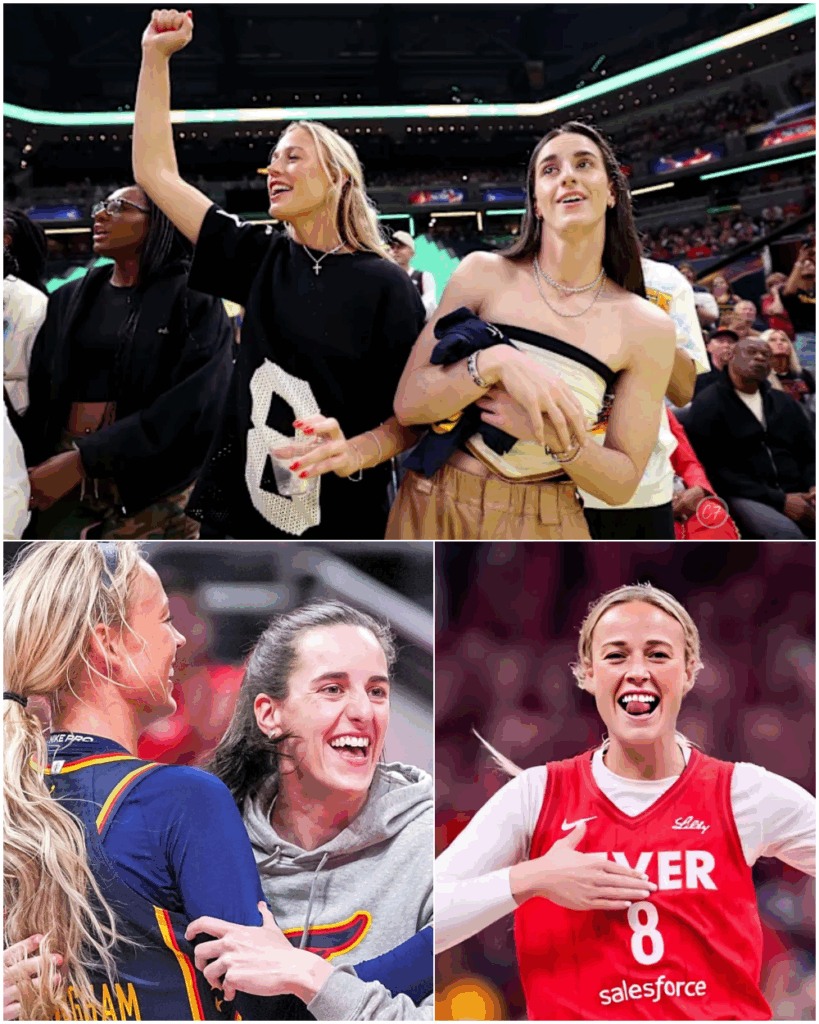BREAKING NEWS: Rachel Maddow Discovers Her Old School Janitor Still Working At 81 YEARS OLD …But No One Was Prepared for What She Revealed About That Night in 1991
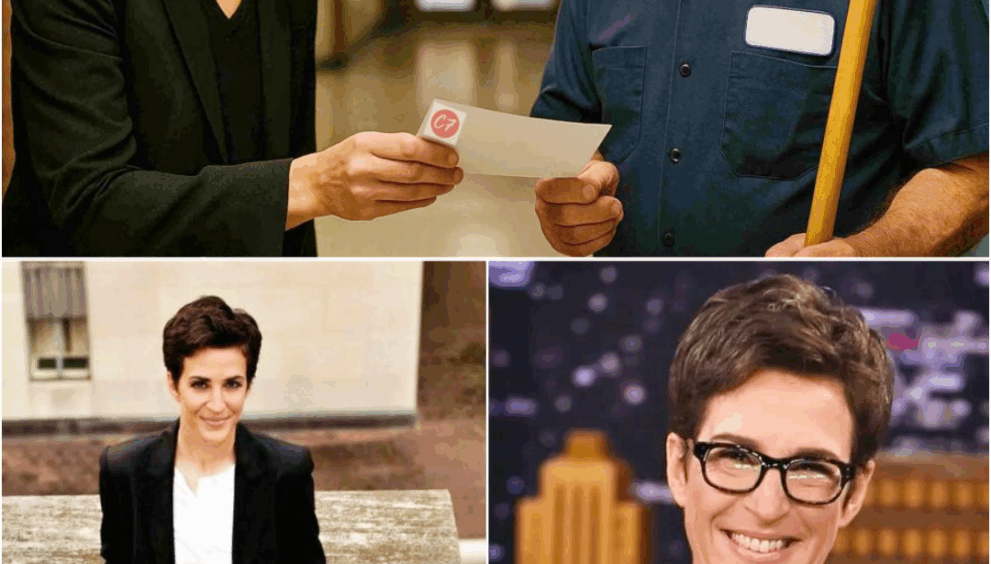
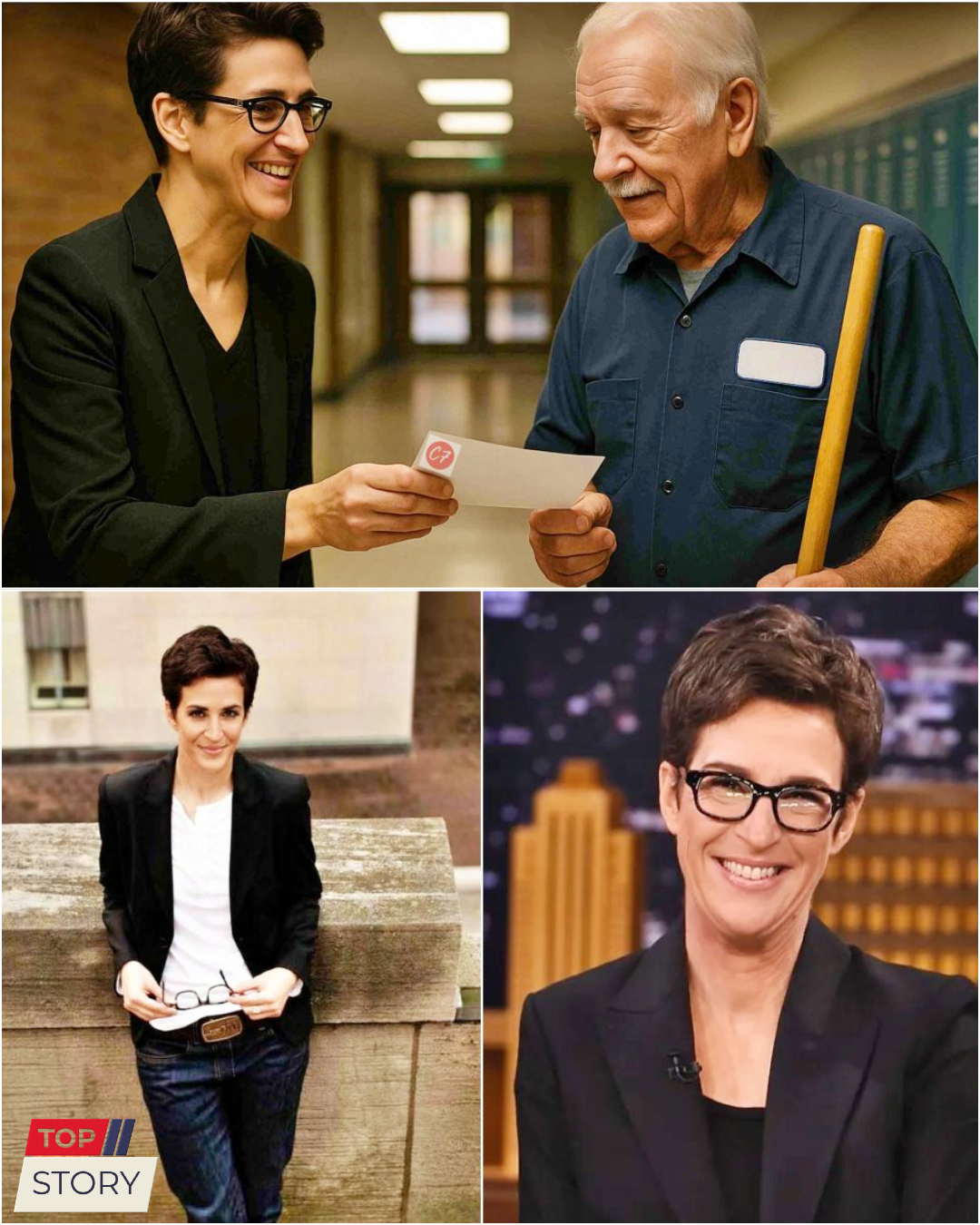
She hadn’t expected this. Not really. She had stepped into the back hallway of Castro Valley High—no cameras, no announcement, no press release—just a woman retracing her silence. But there he was.
Same hallway. Same slow stride. Same ring of keys.
He was still pushing the cart. Still wearing the gray shirt. Still wiping down the same baseboards no one else noticed.
He hadn’t seen her yet.
She stepped back into the shadows, her heart pounding like it used to when she was seventeen and too loud for the room. In her coat pocket, she gripped a note—folded so many times its creases had become part of the paper. Her fingers tightened.
She had walked into a building she thought had forgotten her — and found the only person who never did.
Thirty-four years had passed.
But he never left.
Back then, no one had time for a girl like her.
She was smart. Too smart. Gay. Openly. In 1991.
Teachers smiled tight. Students whispered. The system didn’t punish her—but it didn’t protect her either.
She had dreams of broadcasting. Journalism. Telling the truth, out loud.
So she started something unofficial. A small radio segment. She wrote it out by hand. Recorded into a dusty mic she wasn’t sure even worked. But the door to the booth had been locked that night.
And Rachel—angry, scared, raw—stood outside with a cassette in one hand and the other shaking.
Until she heard his voice behind her.
“You waiting on someone?”
She turned. It was just the janitor. A man who never spoke more than a nod.
She said quietly, “I was gonna try to record something. For the school.”
He looked at her, then at the door.
He pulled out a ring of keys. Found the right one. Opened it.
And said: “You can turn on the mic from the back. Just don’t tell me what you said, unless you want to.”
She didn’t. Not that night.
But he stood in the hallway anyway, mop leaning against the wall, listening.
She hadn’t known that.
Not until years later.
Now, thirty-four years later, she finally stepped forward.
“Mr. Garcia?”
He turned. Squinted.
Then his face lit up.
“Rachel?” he said. “Rachel Maddow?”
She smiled and took off her cap.
“I knew I wasn’t imagining you,” he said, laughing.
“You’re still working here?” she asked.
“Somebody’s gotta keep the lights on.”
“Eighty-one?” she asked gently.
“Last week,” he said. “Didn’t make a big deal.”
She stepped closer.
“You remember the radio booth?”
He smiled. “I never forgot. You came out trembling, handed me that cassette, and said: ‘One day I’ll say this on real radio.’”
Rachel laughed. “I was so dramatic.”
“No,” he said. “You were right.”
She looked down. “I never thanked you.”
“You just did.”
But she wasn’t done.
The next day, a quiet event was held in the school gym.
No press. Just a few teachers. Some old classmates. A few current students.
But one of those students filmed the moment and posted it online.
“This man is still cleaning our school at 81. And someone finally came back.”
The clip hit 3.1 million views by afternoon.
Rachel stood at center court, holding a microphone under the same rafters where her voice had once been denied.
She looked at the crowd, then at him—Mr. Eduardo Garcia, seated in the front row, confused but smiling.
“When I was a student here,” Rachel began, “I didn’t belong.”
She let the silence sit.
“I wasn’t popular. Wasn’t quiet. Wasn’t straight. I didn’t want to cheer. I wanted to challenge.”
Some people chuckled softly. Most just listened.
“I thought no one saw me,” she said. “But one man did.”
She turned to Mr. Garcia.
“He gave me a key.”
“He didn’t ask what I believed. He didn’t ask who I was. He just unlocked a door. And let me speak.”
From her coat pocket, she pulled out a cassette tape—old, dusty, the label barely legible:
March 1991 – “Why We Stay Silent.”
“I never aired this,” she said. “I was too afraid. But I want you to have it.”
She walked down the steps and placed it in his hands.
He stared at it. Then at her. His lips trembled.
She took out something else: a gold-plated key on a ribbon.
“This is the first key to the new Eduardo Garcia Media Lab,” she said.
The gym fell silent.
“From now on,” she continued, “students who feel too loud, too lost, or too different will have a place to speak.”
Applause. A few students stood. A teacher wiped her eyes.
But Rachel wasn’t finished.
“There’s more,” she said.
“What most of you don’t know is—I couldn’t afford blank tapes. I only had one.”
She turned to Garcia.
“And someone paid for a box of them… in cash. Left no name.”
She paused.
“Coach told me last year. Said it was you.”
He looked down.
“I didn’t want you to lose that voice,” he whispered.
Rachel smiled. “You gave me mine.”
Later, in the media lab, they sat in silence.
Fresh paint. Unused mics. A room waiting for voices.
She turned to him.
“Why did you help me? Really.”
He was quiet for a long time.
“My daughter,” he said finally. “Ana. She wanted to be a journalist too.”
Rachel’s heart dropped.
“She came out when she was sixteen,” he continued. “Didn’t go well.”
He stared at the floor.
“They didn’t unlock her doors. They shut them.”
Rachel said nothing.
“She stopped speaking,” he said. “Not just at school. At home. Everywhere.”
A beat passed.
“When I saw you… standing outside that booth… shaking, gripping that tape like it was life or death…”
His voice cracked.
“I thought maybe—if I open the door early enough this time, someone won’t have to lose their voice.”
Rachel swallowed hard.
“You reminded me of her,” he said. “And I wanted to believe someone like her… could still be heard.”
She reached out and held his hand.
Neither said anything.
Not for a long time.
Before she left, Rachel handed him a folded slip of paper—faded, yellowed.
He opened it slowly.
You’re not too loud. The world’s just too quiet. For now.
He stared.
“You kept this?”
“I carried it through Stanford. Through Oxford. Through MSNBC.”
“You shouldn’t have.”
“I had to.”
Outside, the school was quiet.
“Do you ever regret staying here all these years?” she asked.
Mr. Garcia smiled. “I got to hear voices before the world did.”
She nodded.
Then turned and walked away.
Not back into silence.
But forward into it—knowing it would never hold her again.
This piece is presented in reflection of long-held narratives, memories, and the shared legacy of voices carried forward. While the individuals and moments here are portrayed with deep reverence, they serve to illustrate the quiet intersections where dignity, mentorship, and resilience are passed from one generation to the next.
News
BREAKING: Stephen Colbert Played the Phillies Clip Right in the Middle of His Show, Making the Entire Studio Erupt… Then Suddenly Dropped a Joke That Set the Whole Nation Abuzz. No One Expected Stephen Colbert to Do This Live on Television.
The lights washed over the desk. The band hit a bright, teasing sting. Then the screen behind Stephen Colbert flashed to the viral Phillies moment—five seconds of grainy chaos that the internet had been chewing on all day. The room erupted. Whistles, whoops, the kind of laughter that makes the camera operator fight to keep […]
The Child Spoke the Truth — 7 Words That Silenced the Entire Stadium in the Phillies Incident.
The Child Spoke the Truth — 7 Words That Silenced the Entire Stadium in the Phillies Incident An alternate-angle clip from the stands has surfaced — and it is already being called the one detail the main broadcast completely missed. It lasts only a few seconds. The phone shakes. The frame is crooked. Yet for […]
Leavitt Shocked Everyone by Criticizing the Crowd, Rushing to Defend the Phillies Karen, But Just Minutes Later Karoline Wιshᴇd She Had Neνer Sρσker
“The crowd is the real problem.” One line. That was all it took to twist a stadium drama into a nationwide firestorm — and to drag Karoline Leavitt into the kind of spotlight even she couldn’t control. It began on a humid Friday night in Miami. The Phillies were facing the Marlins when Harrison Bader […]
Whoopi Goldberg Broke Her Silence on the Phillies Scandal Live on Air — One Line That Tore Social Media Apart.
The cameras rolled. The studio lights burned white. Chatter filled the air — nervous laughter from the audience, the usual banter from the panel. And then, like a blade slicing through fabric, the noise stopped. Whoopi Goldberg leaned toward her microphone. She didn’t need a warm-up. No build-up. Just six short, razor-sharp words — and […]
But What Hurt Her The Most Did Not Come From The Crowd Outside… But From The Way Those Once Closest To Her Treated Her: So Unfair!
“STOP IT NOW.” The two words sliced through the noise like a knife. A woman in a Phillies jersey finally appeared, trembling, saying she no longer dares to step outside her home. What used to be a simple walk down her street has turned into a gauntlet of strangers shouting, a “new nickname” echoing wherever […]
Karoline Lavitt Walked In With a Face Full of Power and Confidence That Made the Whole Room Pay Attention — But Just One Single Question From the Cleaning Lady Made Her Go Silent.
“Don’t be like that, Lavitt.” The words didn’t come from a rival, a journalist, or even a political heavyweight. They came from the shadows — from the corner where a cleaning lady stood quietly, unseen until she spoke. But before that moment detonated, the silence of the room had already been carved sharp enough to […]
End of content
No more pages to load
